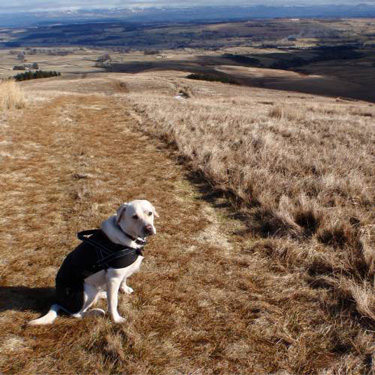
Meet Moss: The 15-year-old lab who’s living his best life despite osteoarthritis
This is a story of a stolen sandwich, a muddy labrador and the medicine that’s controlling pain so a dog can live his best life.

Hello, Moss.
Fifteen years ago, Nick Ashton set out for his first assignment abroad. “I was single, stepping out on my own and making big changes in my life,” says Nick, Global Manufacturing and Supply Lead for Zoetis. “I’d had a dog as a kid, and I thought getting a puppy would be good company. That’s when I found Moss.”
Over time, the energetic yellow lab grew to nearly 70 pounds. He loved sailing, catching a frisbee mid-air and running alongside Nick when he was rollerblading or mountain biking. As Nick moved and traveled for work on trains and planes, Moss did too. “Moss has almost filled up his second passport,” says Nick. “Wherever he goes, he’s always friendly, well-behaved and has a calming influence on everybody he’s with.”

Well, except for that one time, when Nick and Moss were hiking in a muddy forest. “There’s nothing labs like more than soupy mud,” says Nick. “We came across a family having a picnic, and Moss ran up to say hello. The little girl bent down to pet him with one hand, her sandwich in the other. Moss figured that sandwich was his, snatched it and was gone. The girl screamed for 10 minutes.”
The labrador’s energy delighted Nick and his family for years. But around age 11, Moss began to slow down. “We went from throwing a ball or frisbee to having to get a ramp so he could get in the car.”
At times, Moss didn’t want to move. “He would struggle to get up off the floor and move to lie down someplace else. He couldn’t tell me he was in pain, but I could see it in his eyes.”
‘His tail is wagging in the air’
Moss had been on pain medication before, after experiencing a hard landing during a frisbee game. But the medicine was intended for acute pain and could cause serious side effects with long-term use. So, when Moss was diagnosed with osteoarthritis (OA), his veterinarian recommended Librela® (bedinvetmab injection), the first and only once-monthly, anti-NGF monoclonal antibody treatment for canine OA pain. The product had been on the market in Europe since 2021.

Canine OA is a painful and progressive disease. In studies, nearly 40% of dogs have signs of OA.1,2 OA does not only impact older dogs – it affects dogs of all ages, sizes and breeds.3 Signs of OA include, but are not limited to, difficulty in going up or down stairs, lagging behind on walks, hesitation to jump up or down, limping after exercise and becoming more withdrawn.
“The results can vary for dogs, but with Moss, I was gobsmacked at how quickly Librela made a difference. Today, he can go for a walk – he may be a little out of breath, but his tail is wagging in the air. You can see the excitement in his face, and he’s looking forward to what’s coming next.”
A member of the family
Nick says Moss is an extra member of the family. “If I’m eating a meal, he’s at my feet. If we’re taking photos at Christmas, Moss is there with a Santa hat on. If my son is not feeling well, Moss is keeping an eye on him. Our family’s connection with Moss is amazing.”
The human-animal bond is something many pet owners understand. “Dogs are always there for you. Their needs are simple. They want to go out, eat and get some affection, which they give without any requirements,” says Nick. “When you see somebody getting old who’ve you’ve spent so much time with and come to love, that affects you, in the same way as when a family member starts to age.”
Work and well-being
At work, Nick is responsible for the global manufacture and supply of Zoetis’ products around the world. Each day, his teams ensure that customers have the safe, compliant medicines and vaccines they need to keep pets and livestock healthy.

“I don’t think I would have achieved what I’ve done in my career without Moss. Talking about well-being may be a popular topic now, but for a bloke from England, people didn’t talk about well-being 15 years ago. But when you get to the end of a really bad day, there’s nothing like the intuition of a dog. He puts his chin on your knee, like he’s saying, ‘I know,’ and that’s what animals do. They help us connect to what’s important.”
Free to move
Four years ago, Nick’s family got a puppy, a Jack Russell they named Rocky. The family wanted to give Moss someone to play with, and Nick says since Moss has been on Librela, he enjoys playing in the back yard with Rocky.
“I don’t know how much longer I’ll have Moss in my life. He’s not going to be out chasing frisbees or running through the mud to steal a little girl’s sandwich, but he’s comfortable. He can walk around, socialize, get up and down without looking like he’s in pain. That’s what it’s all about. Dogs deserve to live a pain-free existence, just like people.”
Published on January 22, 2024
IMPORTANT SAFETY INFORMATION: For use in dogs only. Women who are pregnant, trying to conceive or breastfeeding should take extreme care to avoid self-injection. Hypersensitivity reactions, including anaphylaxis, could potentially occur with self-injection. LIBRELA should not be used in breeding, pregnant or lactating dogs. LIBRELA should not be administered to dogs with known hypersensitivity to bedinvetmab. The most common adverse events reported in a clinical study were urinary tract infections, bacterial skin infections and dermatitis. See full Prescribing Information.
1 IHS Markit. (2021) Canine and Feline Pain Market 2021: Animal Health Market Analysis.
2 Wright A, et al. Identification of canine osteoarthritis using an owner-reported questionnaire and treatment monitoring using functional mobility tests. J Small Anim Pract, 2022. http://doi.org/10.1111/jsap.13500
3 Anderson KL, Zulch H, O’Neill DG, Meeson RL, Collins LM. Risk factors for canine osteoarthritis and its predisposing arthropathies: a systematic review. Front Vet Sci. 2020;7:200. doi:10.3389/fvets.2020.00220
LIB-00233
Librela received marketing authorization from the European Medicines Agency in 2020 for the alleviation of pain associated with osteoarthritis (OA) in dogs and received approval from the U.S. Food and Drug Administration in May 2023 for the control of pain associated with OA in dogs.
Copyright © Zoetis Services LLC 2013-2024 All rights reserved. The product information provided in this site is intended only for residents of the United States. The products discussed herein may have different product labeling in different countries.
.